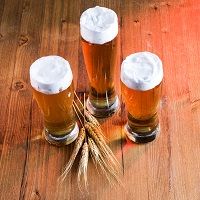Study: Beer-digesting Bacteria Beneficial for Autoimmune Disease?
New research suggests bacteria used for beer and bread digestion could potentially be beneficial for combating yeast infections and autoimmune diseases like Crohn's disease.

New research suggests bacteria used for beer and bread digestion could potentially be beneficial for combatting yeast infections and autoimmune diseases like Crohn’s disease.
A team of scientists led by Harry Gilbert, PhD, professor of biochemistry from Newcastle University, United Kingdom; Eric Martens, PhD, of the University of Michigan's Department of Microbiology and Immunology; and Wade Abbott, PhD, research scientist at Agriculture and Agri-Food Canada, conducted a study that focused on the ways in which the microbes Bacteroidesthetaiotomicron (B. thetaiotaomicron) within the human digestive tract break down complex carbohydrates, called yeast mannans, that hold up the yeast cell wall.
As humans have been consuming fermented food and drink for well over 7,000 years, the researchers believed the “discovery of this process could accelerate the development of prebiotic medicines to help people suffering from bowel problems and autoimmune diseases.”
They found yeast produces health benefits possibly by increasing the bacteroides growth in the microbiome. Mannans had long been known as primary components of fermented foods. As such, Martens said in a news release, “One of the big surprises in this study was that B. thetaiotaomicron is so specifically tuned to recognize the complex carbohydrates present in yeasts, such as those present in beer, wine, and bread”
Martens continued, “However, these bacteria turned out to be smarter than we thought: they recognize and degrade both groups of carbohydrates, but have entirely separate strategies to do so despite the substantial chemical similarity between the host and yeast carbohydrates. Even the relatively small amounts of yeast that we commonly consume in foods are enough to impact the physiology of our friendly gut bacteria.”
The team tested this theory by feeding mice models a diet of 50% yeast-leavened bread baked at the nationally known Zingerman's Bakehouse in Ann Arbor, which were used to create a customized mouse food — the researchers were able to confirm the quantity of yeast consumed.
Further research is underway to shed light on how to easily provide nutrients to targeted microbiome organisms. According to Gilbert, “People are very interested in developing dietary regimens where good bacteria are of benefit. When you have certain bacteria dominant in the gut these microorganisms can produce molecule s which have health-promoting effects.”